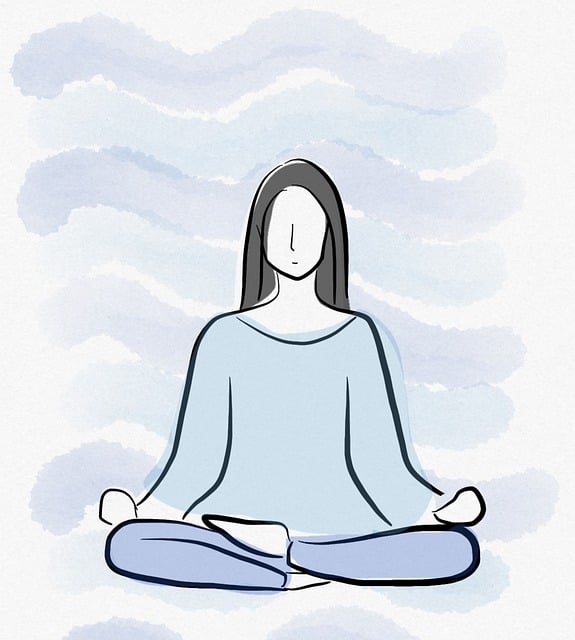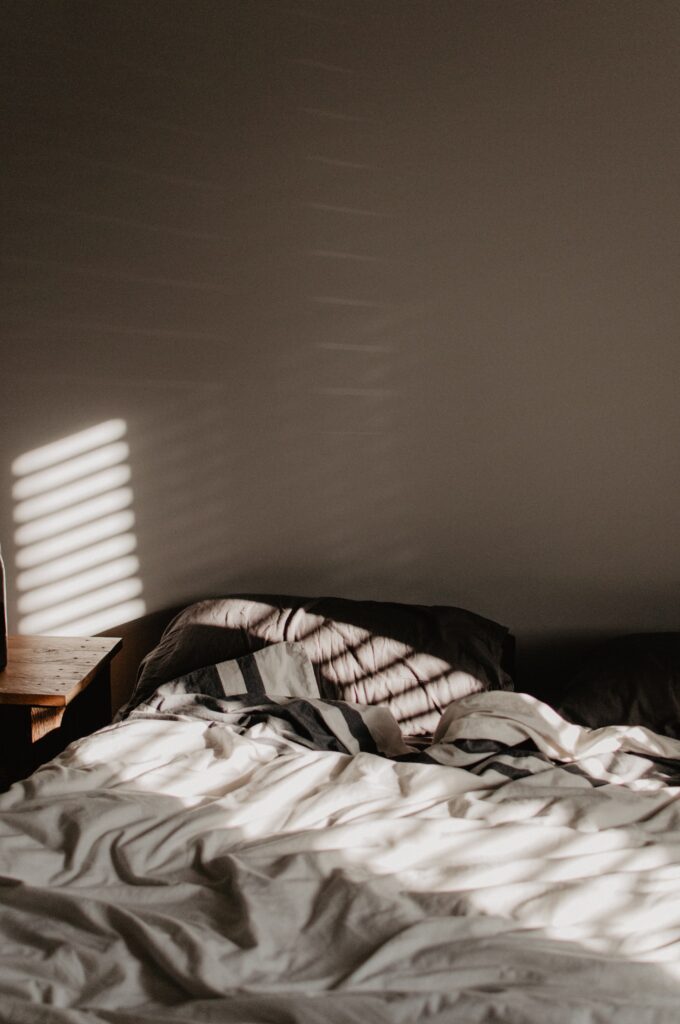Are you wondering how much meditation is equal to sleep? Chances are, you’re either struggling with getting enough sleep (you may want to check out our mindfulness sleep tips), or you’re a productive freak like me that just wants to get a lot done. What would you do with the extra hours of the day if we didn’t need to sleep as much?
Almost everyone has competing demands on their time, making it hard to take care of your wellbeing on top of everything else. The good thing about meditation is that it can help ground you within minutes and improve your focus.
So can we use it as a substitute for sleep? What about other mindfulness activities? Just how much meditation is equal to sleep?
Is Meditation the new sleep?
If you asked this question a decade ago, the answers would be a range of opinions because there just wasn’t enough evidence. But recent research is showing that meditation can be used as an alternative to sleep.
So if your sleep has taken a backseat to other things, you can meditate to make up for it (to a point).
Before we look at how much meditation is equal to sleep, we will look at what meditation is to understand how it can be a substitute for sleep.
What Is Meditation?
While sleep is a physiological need for our bodies, meditation is a conscious practice that calms your mind and reduces stress.
Meditation can be defined as a set of techniques used to focus your attention, calm your thoughts and ground you into reality.
The end goal is always the same for mindfulness activities– achieving a state of mental clarity, relaxation, and calmness.
The practice of meditation is thousands of years old and can be found in Islamic, Hindu, and Buddhist teachings the most. But that doesn’t mean you have to be religious or a spiritual person to practice meditation!
The good thing about meditation is that it’s a liquid act. Meditation can take many forms, from sitting in stillness and observing the breath to moving meditations such as yoga or tai chi.
Whether you deal with anxiety, or insomnia or simply want to focus better, there are a few types of meditation that can help.

Types Of Meditation For Sleep
Different acts of meditation help you differently, and different people have different preferences and requirements. They won’t solve all your problems for you but they can act as an integral part of your self-care routine.
Here are the three best types of mindfulness activities or meditation for sleep:
Mindfulness Meditation
Mindfulness activities and meditation are the most common type of meditation. According to the Greater Good Science Center at UC Berkeley, mindfulness meditation involves paying attention to your thoughts and feelings without judging them– without being attached to a “right” or “wrong” way to think or feel in a given moment.
There are many mindfulness activities you can engage in. Here are three easy ways to practice mindfulness meditation:
- Focus on your breath: Sit comfortably in silence and focus on your breath. Pay attention to the feeling of air entering and leaving your body. Breathwork is best done in silence or in open nature.
- Body scan: Lie down or sit comfortably and focus your attention on each part of your body, moving from the toes to the top of your head.
- Walking meditation: Walk slowly but mindfully, paying attention to each step and the sensations within your body as you move. a
Guided Meditation
Guided meditation is a form of meditation that involves listening to a teacher or recording that provides guidance and instruction throughout the meditation practice.
According to the Chopra Center, guided meditation means being led through meditation by someone else, often accompanied by music or soothing sounds.
- Visualization: A teacher or recording may guide you through a visualization of a peaceful scene like a beach or a forest, to help you relax and reduce stress.
- Body scan: Lie down or sit comfortably and focus your attention on each part of your body, moving from the toes to the top of your head. These help you to become more aware of your physical sensations and release tension in your body.
- Loving-kindness meditation: Through a teacher or recording, you focus on sending loving and kind thoughts to yourself and others.
Qigong
Unlike guided meditation and mindfulness activities, Qigong is a little different.
The National Qigong Association defines this branch of meditation as a practice to strengthen physical and mental health.
It’s often referred to as the mind-body-spirit practice, especially because Qigong has 3 types of practices:
- Martial Qigong: Improve your physical health and martial arts skill through different sets of exercises. These exercises strengthen muscles and joints along with improving body coordination and response rate.
- Mental Qigong: Focus on your mental awareness and relaxation by practicing mindfulness activities like breathwork and body scans.
- Spiritual Qigong: A practice to improve your connectivity with yourself, your surroundings, and other people by acts of loving-kindness and observing aware thoughts.
Now that you know the types of mindfulness activities and meditation that you could substitute for some sleep, let’s talk about the science behind it.
How Much Meditation Is Equal To Sleep?
There are many different answers to this question, depending on the study and research you look into. It’s a bit of a chicken-and-egg situation!
Some research at the University of Kentucky found that even novice meditators could improve their reaction times after meditation when sleep deprived. They also found that experienced mediators had a significant decrease in total sleep time.
You can start by building with 10 minutes of mindfulness activities and increasing it over time.
Oregon State University’s College Of Business found 10 minutes of intense and deep meditation replaces 44 minutes of deep sleep, where your body begins the reparative process and improves emotion regulation.
I know what you’re thinking… “what’s the right answer?!” Getting to a state of intense and deep meditation in itself can be hard. The time it takes to get into that state varies between each session and person.
There’s still a lot of uncertainty in replacing sleep with meditation, especially because they’re two different things.
Sleep is a physiological need, important for cognitive function and the physical repairing of your body.
Meditation can make up for times you’re running low on sleep hours or you can’t nap during a really stressful day.
For instance, if it’s a big day and you are energetically all over the place, you can meditate in a quiet space for a few minutes to regulate yourself and replicate the state of deep sleep.
Can Meditation Fully Replace Sleep?
The answer is emphatically NO. Please do not try this.
Meditation can’t fully replace sleep, but it can help you get more out of your waking hours.
If you’re always trying to make up for lost sleep by meditating instead of sleeping, you’ll probably end up feeling worse than if you had just gone ahead and slept.
So it’s not like you can just replace sleep with meditation– you do really have to make sure that you’re getting enough sleep (and not just any old amount of sleep, but the kind that helps you feel alert and awake). I know how hard this is.
One of the main reasons meditation isn’t an exact substitute for sleep is that it doesn’t provide the same physical restoration as getting adequate rest. During deep sleep, our bodies go through a process called cellular renewal where your damaged cells are repaired. As a result, we wake up feeling energized and ready for the day ahead.
But what if I tell you that meditation can improve your sleep quality, leading to you needing lesser hours of sleep to wake up fresh? Sounds too good to be true?
Can Meditation Help Me Sleep Better?
Yes it can!
Are you waking up feeling even worse than when you went to bed? Do you feel unfulfilled with how many times you wake up at night or how long it takes to simply fall asleep?
I’m sure you’ve heard the phrase “quality over quantity”, meaning your sleep quality matters much more than the hours you get.
Mindfulness activities and meditation have been found to improve insomnia symptoms, according to a study conducted in 2015.
Another review of studies showed that mindfulness-based interventions reduced symptoms of anxiety and depression, two major conditions that impact sleep quality.
All of these studies gave one common conclusion– meditation was helping you fall asleep faster, wake up less during the night, and feel fulfilled with even a few hours each night.
So when meditation improves your sleep quality, you ultimately end up needing to sleep fewer hours the next day. In that way, meditation is certainly helping people replace sleep, making “how much meditation is equal to sleep” a very valid question!

How To Replace Meditation With Sleep?
Sleep and meditation are both important for health. Ideally you can fit both into your everyday routine, but this is not always possible.
I love a shortcut just as much as you do, and here’s how you can replace a specific dedicated meditation session with sleep in your hectic life. Basically using some brilliant sleep hygiene techniques in a mindfulness way. Nice!
Create a relaxing bedtime routine
Establishing a routine that helps you wind down before bed can help you fall asleep more quickly and improve the quality of your sleep.
This could include activities such as taking a warm bath, relaxing music, reading a book, or practicing gentle stretching or yoga.
Make your sleeping environment cozy
Ensure that your bedroom is quiet, cool, and dark to promote restful sleep. When travelling I have a roll of electrical tape in my handbag to cover over any glowing lights (like on smoke detectors or the tv stand-by light).
Invest in comfortable bedding and pillows to make your bed as inviting as possible.
Put away any and all screens, including your phone, laptop, and TV.
Practice mindfulness before bed
Instead of traditional meditation, you can try incorporating mindfulness activities into your bedtime routine.
This could include breathing exercises or body scan meditations that help you relax and let go of the stresses of the day.
Prioritize good sleep hygiene
Maintain a regular sleep schedule, avoid caffeine and alcohol before bed, and limit screen time in the hours leading up to bedtime.
Eat dinner at least two hours before you have to sleep.
Also limit the noise in your surroundings as much as you can. If that is not possible you could try earplugs.
Factors Affecting Your Sleep Needs
If you wonder how much meditation is equal to sleep for you, it’s important to know how much sleep you need in the first place.
Unlike popular belief, you don’t necessarily need seven hours of sleep. Your recommended sleep amount relies on a heap of personal factors.
Let’s consider the top three that you need to consider when thinking about how much meditation is equal to sleep!
Age
Our sleep needs change as we age, making it the top factor to consider when finding how much meditation is equal to sleep for you.
Infants typically sleep up to 17 hours a day, while adults need between seven and nine hours of sleep (less if you are an experienced meditator as we looked at earlier).
Teenagers often go through a change in their sleep cycle, tending to sleep late and wake even later.
Older adults and seniors may require slightly less sleep, around seven to eight hours per night, due to changes in sleep patterns as we age.
As we age, our sleep tends to become lighter and more easily disrupted, leading to more wakefulness during the night.
Gender
Gender can also play a role in sleep needs. Women generally require slightly more sleep than men due to differences in hormonal and biological factors.
Women are also more likely to experience insomnia, sleep apnea, and other sleep disorders, which can impact sleep quality and quantity.
While men can do well with six to seven hours of sleep a day, women will often be recommended to sleep between seven and nine hours.
Lifestyle
A person’s lifestyle can have a significant impact on their sleep needs.
Various factors such as physical activity, stress levels, and diet can influence how much sleep an individual requires.
A good level of regular physical exercise can improve sleep quality and reduce the amount of time it takes to fall asleep. I know it is easer to drop off to sleep and stay asleep if I have done a long run or just been really physically busy. I think my record step count days were when moving house and I slept like a log at night.
On the other hand, stress can disrupt sleep and increase the likelihood of developing sleep disorders like insomnia.
If you’re consuming caffeine, alcohol, and nicotine close to bedtime, your sleep will often be disturbed. Never mind if there are dependants in the house that you are caring for. Sometimes these things can be hard to change, but understanding and quantifying their impact of your own wellbeing can be helpful.
Conclusion
Mindfulness activities amongst meditative ones are gaining quite the name for improving your sleep, and even replacing part of it.
While meditation can be a helpful tool in improving the quality of your sleep, it’s not a complete replacement for getting the actual amount of sleep your body needs.
At the very least, incorporating meditation into your daily routine can help alleviate sleep issues and reduce stress levels.
By practicing mindful meditation throughout the day as part of a healthy lifestyle that includes exercise and good nutrition, you can reap the benefits of both practices.
In this article, we tackled just how much meditation is equal to sleep (it depends) and how you can improve your sleep (and quality of life) by practicing mindfulness activities.
So that is a lot of information about how much meditation is equal to sleep and some associated mindfulness activities. Please comment below with your thoughts about these below. We would love to hear how it is does (or doesn’t) work for you.





